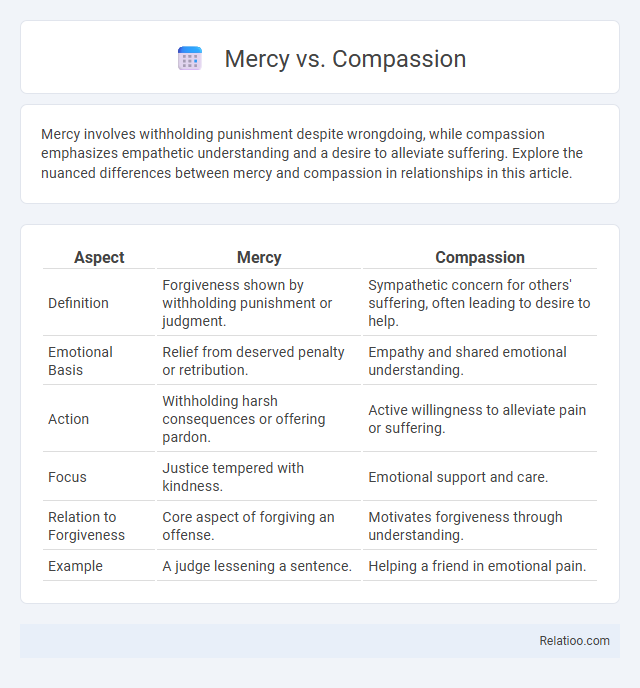Mercy involves withholding punishment despite wrongdoing, while compassion emphasizes empathetic understanding and a desire to alleviate suffering. Explore the nuanced differences between mercy and compassion in relationships in this article.
Table of Comparison
| Aspect | Mercy | Compassion |
|---|---|---|
| Definition | Forgiveness shown by withholding punishment or judgment. | Sympathetic concern for others' suffering, often leading to desire to help. |
| Emotional Basis | Relief from deserved penalty or retribution. | Empathy and shared emotional understanding. |
| Action | Withholding harsh consequences or offering pardon. | Active willingness to alleviate pain or suffering. |
| Focus | Justice tempered with kindness. | Emotional support and care. |
| Relation to Forgiveness | Core aspect of forgiving an offense. | Motivates forgiveness through understanding. |
| Example | A judge lessening a sentence. | Helping a friend in emotional pain. |
Understanding Mercy and Compassion: Key Differences
Understanding mercy involves showing leniency and forgiveness toward someone who has done wrong, often in a position of authority, while compassion focuses on empathizing with another's suffering and wanting to alleviate it. Mercy is an active choice to withhold punishment despite having the power to enforce it, whereas compassion prompts you to provide care and support out of genuine concern. Your ability to distinguish these concepts helps deepen emotional intelligence and enhances interpersonal relationships.
The Origins and Meanings of Mercy and Compassion
Mercy originates from the Latin word "merces," meaning reward or pity, and emphasizes leniency shown to someone whom one has power over, often in the context of justice or punishment. Compassion derives from the Latin "compassio," which means to suffer with, highlighting a deep empathy and desire to alleviate another's pain or suffering. Both mercy and compassion involve kindness, but mercy centers on forgiveness and clemency, while compassion focuses on emotional resonance and active support.
Mercy in Cultural and Religious Perspectives
Mercy encompasses leniency and forgiveness extended to others, often rooted in cultural and religious doctrines such as Christianity, Islam, and Buddhism, where it is regarded as a divine or moral virtue. In your exploration of mercy, you will find it deeply embedded in rituals, teachings, and practices that emphasize forgiveness, compassion, and humanitarian kindness. Unlike compassion, which involves empathy and a desire to alleviate suffering, mercy specifically involves sparing someone from punishment or harm according to ethical or spiritual guidelines.
Compassion Across Spiritual and Secular Traditions
Compassion, embraced across spiritual and secular traditions, centers on deep empathy and the active desire to alleviate suffering, distinguishing it from mercy, which often implies leniency or forgiveness. Your understanding of compassion can be enriched by exploring its role in Buddhism as loving-kindness, in Christianity as agape love, and in secular psychology as emotional resonance and altruistic behavior. This universal emphasis on compassion highlights its power to foster connection, healing, and ethical action beyond religious boundaries.
Psychological Aspects: How Mercy and Compassion Shape Behavior
Mercy involves forgiveness and alleviating punishment, promoting psychological healing by reducing guilt and fostering trust, while compassion drives empathetic concern that motivates helping behaviors and emotional support. Your capacity for mercy can enhance interpersonal relationships through acceptance, whereas compassion nurtures prosocial behavior by understanding others' suffering. Together, mercy and compassion influence emotional regulation and social bonding, shaping more empathetic and cooperative behavior patterns.
Mercy vs Compassion in Interpersonal Relationships
Mercy involves showing leniency or forgiveness toward someone who has wronged you, often by withholding punishment, while compassion is the empathetic desire to alleviate another person's suffering through kindness and understanding. In interpersonal relationships, mercy allows you to maintain trust and repair bonds by forgiving mistakes, whereas compassion fosters deeper emotional connections by actively supporting others during their hardships. Your ability to balance mercy and compassion strengthens relationships by combining forgiveness with genuine care.
Real-World Examples: Acts of Mercy and Compassion
Acts of mercy include providing immediate relief like food or shelter to those in crisis, while compassion involves a deeper emotional connection motivating ongoing support such as counseling or advocacy. Your ability to show mercy may save lives in emergency situations, whereas compassion fosters long-term healing and understanding in communities affected by hardship. Real-world examples include medical teams offering emergency care (mercy) and volunteers running support groups to address trauma (compassion).
The Role of Empathy: Bridging Mercy and Compassion
Empathy serves as the crucial bridge between mercy and compassion by allowing you to deeply understand the suffering of others, which fuels both merciful actions and compassionate responses. Mercy involves forgiveness or leniency shown to someone who deserves punishment, while compassion motivates active assistance to relieve pain or hardship. By cultivating empathy, your ability to extend mercy transforms into genuine compassion that addresses the root causes of suffering effectively.
Benefits of Practicing Mercy and Compassion
Practicing mercy and compassion fosters emotional healing by promoting empathy and reducing anger, which enhances interpersonal relationships and community cohesion. Acts of mercy alleviate suffering through forgiveness and support, leading to increased mental well-being and resilience for both the giver and receiver. Cultivating compassion encourages altruistic behaviors that improve social harmony and contribute to a more empathetic and just society.
Choosing Mercy or Compassion: Practical Implications in Daily Life
Choosing mercy or compassion impacts your daily interactions by shaping how you respond to others' suffering. Mercy involves withholding judgment or punishment, offering relief from hardship, while compassion drives you to actively alleviate pain through empathy and supportive actions. Understanding the practical implications of each helps you tailor your response effectively--mercy suits situations requiring forgiveness and leniency, whereas compassion encourages proactive care and connection.

Infographic: Mercy vs Compassion
 relatioo.com
relatioo.com